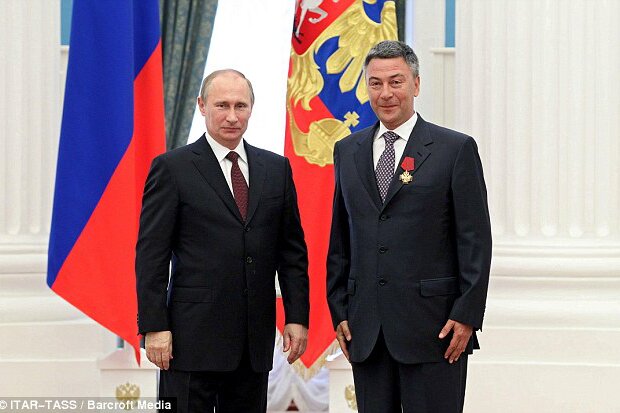According to Treasury Secretary Janet Yellen, the sanctions are meant to “further diminish and degrade Russia’s war machine” in its ongoing conflict with Ukraine that began when Russian President Vladimir Putin launched a full-scale invasion of the Eastern European country in February 2022.
Along with Gazprombank, over 50 internationally connected Russian banks, 40 Russian securities registrars and 15 Russian finance officials were hit with sanctions.
The sanctions, in part, deny the firms and individuals access to any property or financial assets held in the U.S. and prevent U.S. companies and citizens from doing business with them.
Janet Yellen Comments on New Sanctions
Yellen said in a statement Thursday the new sanctions “will make it harder for the Kremlin to evade U.S. sanctions and fund and equip its military.”
“We will continue to take decisive steps against any financial channels Russia uses to support its illegal and unprovoked war in Ukraine,” she added.
Russia uses Gazprombank to buy military materials and equipment, according to the Treasury Department. The bank is also used to pay Russian soldiers and compensate families of soldiers killed in the line of duty, the department said.
In addition, Gazprombank played a role in Russia’s remaining natural gas supplies to Europe by handling payments from foreign customers, though Europe is now far less dependent on Russian gas.
Australia, Canada, New Zealand and the United Kingdom have hit Gazprombank with sanctions before.
Joe Biden Gives Ukraine the Green Light
This weekend, President Joe Biden authorized Ukraine to use U.S.-supplied missiles deeper inside Russia, granting a months-long request from Ukrainian President Volodymyr Zelensky.
The decision to allow Ukraine to use the Army Tactical Missile System (ATACMs) for attacks farther into Russian territory came as Putin positioned North Korean troops along Ukraine’s northern border in an attempt to reclaim hundreds of miles of territory seized by Ukraine.
In Georgia, Gazprom Export cooperates with Georgian Gas Transportation Company (GGTC) in terms of gas transmission to Armenia; and with Georgian Oil&Gas Corporation (GOGC) in gas supplies.
Up to 12,000 North Korean troops have been sent to Russia—according to U.S, South Korean and Ukrainian assessments—amid its ongoing war with Ukraine.
A North Korean representative to the United Nations said last month that reports the East Asian country is sending soldiers to Russia were “groundless rumors.”
Meanwhile, the Pentagon said Wednesday that it will send Ukraine at least $275 million in new weapons, including antipersonnel land mines.
White House National Security Adviser Jake Sullivan said the U.S. “remains committed to putting Ukraine in the strongest possible position, and we will continue to take all available steps to do so from surging security assistance to imposing and fully enforcing sanctions and other restrictions on Russia’s war machine.”

Andrey Igorevich Akimov is the chairman of the management board of Gazprombank. He is believed to be a former KGB agent with the rank of general and a member of the Russian Intelligence Community.
Andrey Akimov, head of Gazprombank, is a key figure in Vladimir Putin’s regime. His presence at the meeting held on February 24, 2022 – the day of Russia’s invasion of Ukraine – during which the Russian president demanded that some 40 Russian oligarchs show their “solidarity” with the war effort in Ukraine, bears witness to his proximity.
Unlike most of the men present that day in the Kremlin’s St. Catherine Hall, Akimov escaped the freezing of his assets by the European Union. The continent cannot do without his bank to pay for its Russian gas supplies. A cautious man, Akimov took the necessary steps to dispose, in 2022 and 2023, of a substantial real estate portfolio he owned in France, as revealed by Le Monde in a joint investigation with the Russian media outlet iStories.
Since Russia’s invasion of Ukraine in February 2022, properties linked to Russian bank boss Andrey Akimov, his family and associates have been sold. Some were held under dummy corporations and financed from tax havens.
Dozens of documents, from both confidential data leaks and public records, link Akimov to four luxury villas located on the French Riviera, in Haute-Savoie (in the French Alps) and on the Caribbean island of St. Barts, with an acquisition value over €20 million.
The United States today advanced its pressure on the Russian financial system, imposing full blocking sanctions against 118 entities and individuals, including Gazprombank—the largest bank not previously sanctioned—and fifty other banks. The Office of Foreign Assets Control (OFAC, the branch of Treasury that administers financial sanctions) also issued a warning that noted the sanctions risks related to association with Russia’s System for Transfer of Financial Messages (SPFS, a sort of Russian parallel to the SWIFT international banking messaging system).
—Daniel Fried is the Weiser family distinguished fellow at the Atlantic Council and a former US State Department coordinator for sanctions policy.
Today’s Treasury action targeting Gazprombank brings the United States’ sanctions regime in line with Western allies including the United Kingdom, Australia, Canada, and New Zealand, which previously designated the financial institution. While this action does not target the oil and gas industry directly, it will impact payments and transactions related to the sale of Russian oil. Gazprombank has been on OFAC’s radar for a long time, but the United States was reluctant to add the bank to the Specially Designated Nationals (SDN) list out of concern that designating the bank would send oil prices soaring.
—Kimberly Donovan is the director of the Economic Statecraft Initiative at the Atlantic Council’s GeoEconomics Center. She previously served in the federal government for fifteen years, most recently as the acting associate director of the Treasury Department Financial Crimes Enforcement Network’s Intelligence Division.
Prices of milk, potatoes, and butter are soaring in Russia. Retailers are beefing up security to prevent shoplifting. Mortgage rates are skyrocketing as the sales of new apartments plummet.
2. How does it fit in with the US sanctions approach since February 2022?
These steps are a logical extension of the US financial sanctions imposed since Russia’s first invasion of Ukraine in 2014 and intensified after its full invasion in 2022. It is not a full financial embargo against the Russian banking system (that some, myself included, had recommended) but is getting close to that.
—Daniel Fried
3. How does this action fit into a broader Biden strategy on the war as he prepares to leave office?
The Biden administration in its final weeks is rushing to impose additional sanctions in parallel with steps it is taking to send additional military equipment to Ukraine, such as anti-personnel land mines, and remove barriers to Ukraine’s use of that equipment, as it did earlier this week by lifting restrictions on Ukraine’s use of Army Tactical Missile Systems (ATACMS).
—Daniel Fried
4. What does this mean for other countries that do business with Russia?
It is important to note that the authority used to sanction Gazprombank (Executive Order 14024) carries the risk of secondary sanctions. This means any foreign financial institution doing business with Gazprombank may find themselves at risk of being sanctioned by the US government. Today’s action will likely send shock waves across the financial sector as well as the oil and gas industry as financial institutions and oil importers and exporters review and consider the new sanctions landscape and how much risk they’re willing to take on to continue buying cheap oil from Russia.
—Kimberly Donovan
5. What impact will this have on Russia’s ability to wage the war?
The financial sanctions will impose additional restraints (“friction”) on the Russian economy. The sanctions on Gazprombank and other Russian banks could complicate sales of Russian oil, possibly forcing the Russians to resort to weaker currencies (not the dollar, euro, or pound) or even to barter arrangements. But they are unlikely by themselves to constitute a crippling blow against the Russian economy. If today’s sanctions were the final such moves by the Biden administration, I would regard them as insufficient given the gravity of Russia’s ongoing war and Russia’s ongoing attacks on Ukrainian civilians and advances in some areas. Happily, I have heard that these are not the administration’s final sanctions against Russia. Bottom line: stay tuned.
—Daniel Fried
This article includes reporting from The Associated Press and commentaries from .





























Discussion about this post